Today’s Current Affairs: 24th June 2025 for UPSC IAS exams, State PSC exams, SSC CGL, State SSC, RRB, Railways, Banking Exam & IBPS, etc
Table of Contents
Rare Donor Registry of India (RDRI) With e-Rakt Kosh:
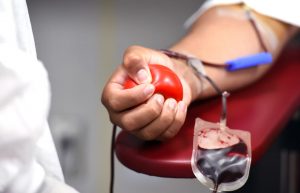
The Union Health Ministry is integrating the Rare Donor Registry of India (RDRI) with e-Rakt Kosh to enable real-time access to rare blood types (such as Bombay, Rh-null, P-Null) and improve nationwide coordination among blood banks.
- The Rare Donor Registry of India (RDRI) is a national database of rare blood group donors.
- It was developed by the Indian Council of Medical Research–National Institute of Immunohaematology (ICMR-NIIH) in collaboration with leading medical institutes.
- RDRI supports patients who require specially matched transfusions, particularly those suffering from thalassemia, sickle cell disease, and other rare conditions.
- The registry includes over 4,000 screened donors, tested for more than 300 rare blood markers.
- It focuses on blood groups that either lack high-frequency antigens or have uncommon antigen combinations.
- Rare blood groups are difficult to match. Transfusing incompatible blood may cause alloimmunisation, where the patient develops antibodies against transfused blood, complicating future treatments.
e-Rakt Kosh:
- e-Rakt Kosh is a centralized digital blood bank management system developed by CDAC under the National Health Mission.
- It provides real-time information on blood availability, donation camps, and blood banks across India.
- The platform connects donors, hospitals, and blood banks, enabling efficient tracking and safe transfusions.
NAVYA Initiative:
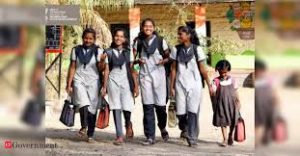
The Government of India launched NAVYA (Nurturing Aspirations through Vocational Training for Young Adolescent Girls) to provide vocational training to adolescent girls aged 16–18 years with at least a Class 10 qualification, especially in non-traditional job roles.
- It is a joint pilot initiative by the Ministry of Women and Child Development (MWCD) and the Ministry of Skill Development and Entrepreneurship (MSDE).
- 27 districts across 19 States, including Aspirational Districts and those in the North-Eastern region.
- Draws on schemes like Pradhan Mantri Kaushal Vikas Yojana (PMKVY) and PM Vishwakarma Yojana, formalizing inter-ministerial coordination.
- It aligns with the Viksit Bharat@2047 vision and promotes women-led development and reinforces the Government’s commitment to building a skilled, self-reliant, and inclusive workforce, positioning young girls as agents of socio-economic transformation.
Zonal Councils:

The Union Home Minister and Minister of Cooperation chaired the 25th Central Zonal Council meeting in Varanasi, Uttar Pradesh, organized by the Inter-State Council Secretariat in collaboration with the Uttar Pradesh Government.
- Zonal Councils are statutory bodies (not constitutional) established under the States Reorganisation Act, 1956, as a high-level advisory forum to foster cooperative working among states and to create a healthy inter-State and Centre–State environment.
- The idea of Zonal Councils was first proposed by former Prime Minister Jawaharlal Nehru in 1956 during debates on the States Reorganisation Commission’s (Fazal Ali Commission, 1953) Report.
- Under Sections 15 to 22 of the States Reorganisation Act, 1956, five Zonal Councils were established.
- The North Eastern region has a separate council, the North Eastern Council, created in 1972, set up under the North Eastern Council Act, 1972.
- Union Home Minister (for all 5 Zonal Councils). He is also the ex-officio Chairman of the North Eastern Council (NEC).
Vice-Chairman: Chief Minister of one of the member states (by annual rotation). - The members include the Chief Ministers, Lieutenant Governors, or Administrators of the member States and Union Territories.
- Additionally, from each member state, the Governor nominates two ministers as members of the Council.
- One nominee from NITI Aayog (earlier Planning Commission), Chief Secretaries, and Development Commissioners of the member states.
- Each Zonal Council has a Permanent Committee comprising the Chief Secretaries of member states.
- State-proposed issues are first discussed by this committee, and unresolved matters are then placed before the full Zonal Council for further deliberation.
- Zonal Councils serve as a structured platform for dialogue and coordination on issues involving two or more states or the Centre and states, promoting mutual understanding and cooperation.
WMO’s State of the Climate in Asia 2024 Report:
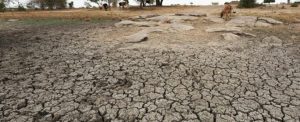
India’s eastern and western coastal regions are witnessing faster sea level rise than the global average, according to WMO’s State of the Climate in Asia 2024 report, posing an increasing threat to livelihoods and infrastructure.
Key Trends in India:
- Arabian Sea rising at 3.9 ± 0.4 mm/year and Bay of Bengal at 4.0 ± 0.4 mm/year, both surpassing global average of 3.4 mm/year, threatening coastal zones.
- Low-lying regions within 50 km of India’s coast face increasing submergence risk, endangering livelihoods and urban infrastructure.
- 23 of 24 glaciers in the Central Himalayas are losing mass, accelerating flood risk from glacial lake outburst floods (GLOFs).
- Over 450 deaths reported in 2024 due to prolonged and extreme heatwaves affecting multiple Indian states.
- Lightning incidents claimed 1300 lives in 2024 and a single deadly event killed 72 people across five Indian states on July 10.
- Asia is heating at twice the global rate, amplifying regional climate impacts like droughts, floods, and storms.
- 2024 marked the second warmest year on record in Asia, with widespread, prolonged heatwaves across several countries.
- Increased frequency of landslides and floods, e.g., Kerala’s Wayanad landslide (350+ deaths after 500 mm rainfall in 48 hours).
- Glaciers in Himalayas and Tian Shan are melting rapidly, increasing GLOF events and downstream flooding risk.
UNEP launched the NDC Cooling Guidelines 2025:
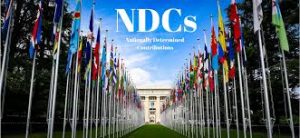
The UNEP launched the NDC Cooling Guidelines 2025 to help countries integrate sustainable cooling into Nationally Determined Contributions (NDCs), addressing rising emissions and heat-related vulnerabilities.
UNEP launched the NDC Cooling Guidelines 2025:
- A global framework offering countries a structured process to include cooling measures in climate plans (NDCs) to balance mitigation, adaptation, and development goals.
- Developed by: UNEP Cool Coalition NDC Working Group with partners like UNDP.
- Objectives:
- Integrate sustainable cooling in NDCs.
- Cut sector emissions by 60% by 2050.
- Improve access to life-saving cooling for 1.1 billion people.
- Strengthen MRV (Monitoring, Reporting, Verification) for cooling measures.
- Align with Kigali Amendment and Global Cooling Pledge.
- Data & Stats from the Report:
- Cooling = 7% of global GHG emissions today and could exceed 10% by 2050.
- 1.1 billion people lack access to cooling, risking lives, food security, and health.
- Cooling uses 20% of building electricity worldwide and over 50% in UAE buildings.
- By doubling appliance efficiency, cooling access can grow 6 times without proportional rise in emissions.
Training of Trainers (ToT) Programme:
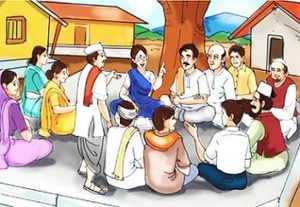
The Ministry of Panchayati Raj (MoPR), in partnership with IIM Ahmedabad, has launched a Training of Trainers (ToT) programme to strengthen Panchayats’ capacity to generate Own Source Revenue (OSR) under the Rashtriya Gram Swaraj Abhiyan (RGSA).
- Training of Trainers (ToT) programme is it a new training initiative to strengthen the financial autonomy of Panchayats by enhancing their capability to generate Own Source Revenue (OSR).
- Ministry: Ministry of Panchayati Raj (MoPR)
- In collaboration with IIM Ahmedabad and Indian Institute of Public Administration (IIPA)
- Objective:
- Empower Panchayats to become financially self-reliant.
- Equip trainers with strategies for sustainable OSR generation.
- Promote leadership, innovation, and accountability at the Panchayat level.
Terminally Ill Adults (End of Life) Bill : UK Parliament
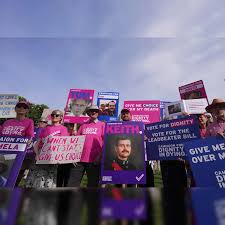
The UK Parliament has passed the Terminally Ill Adults (End of Life) Bill in the House of Commons, which allows terminally ill patients with less than six months to live to opt for assisted dying in England and Wales.
- UK Terminally Ill Adults (End of Life) Bill is a legislation that enables terminally ill adults to legally end their life under strict medical and legal oversight.
- Features of the Bill:
- Applicable in England and Wales.
- Restricted to patients with less than 6 months to live.
- Requires approval by two doctors, a psychiatrist, a senior lawyer, and a social worker.
- The word “Euthanasia” comes from Greek, meaning “good death”. It refers to the intentional act of ending a person’s life to relieve them from unbearable pain or terminal illness, usually when there is no hope of recovery.
Household Income Survey in 2026:

The Ministry of Statistics and Programme Implementation (MoSPI) has announced that India will conduct its first comprehensive Household Income Survey in 2026.
- A nationwide Household Income Survey aimed at generating robust and reliable data on income distribution across India for the first time.
- Ministry & Organisations Involved:
- Ministry of Statistics and Programme Implementation (MoSPI)
- National Sample Survey (NSS)
- Technical Expert Group (TEG) led by Dr. Surjit S. Bhalla.
- Features of the 2026 Survey:
- First nationwide survey solely focused on household income distribution.
- Overseen by Technical Expert Group (TEG) to incorporate global best practices.
- Focus on developing conceptual clarity, sampling design, and estimation methodology.
- Incorporates digital tools to improve accuracy and capture impact of technology on wages and income.
- Builds on MoSPI’s recent statistical innovations (unincorporated sector surveys, services sector, private capital expenditure, and tourism data).
Ambubachi Mela 2025:
Thousands of devotees are attending the Ambubachi Mela 2025 at Assam’s Kamakhya Temple, which celebrates the annual menstruation of Goddess Kamakhya, a key event in Tantrik Shaktism.Ambubachi Mela is an annual religious festival held at Kamakhya Temple, Guwahati. It marks the menstrual cycle of Goddess Kamakhya, symbolising the fertility of the earth. The term “Ambubachi” means “water flowing,” linking the festival with monsoon rains and fertility.
Tripura Declared Fully Literate Under ULLAS:
Tripura has become the third Indian state, after Mizoram and Goa, to achieve full functional literacy as per the national benchmark of 95% literacy among individuals aged 15 years and above. The announcement was made on June 23, 2025, during a grand ceremony at Rabindra Satabarshiki Bhawan, Agartala, with the presence of Chief Minister Prof. (Dr.) Manik Saha and senior officials from the Ministry of Education. Tripura has been officially declared fully literate under the ULLAS (New India Literacy Programme), a flagship centrally sponsored scheme launched in 2022. This recognition marks a major step towards Viksit Bharat @2047, demonstrating the success of community-driven adult education and Jan Bhagidari (people’s participation).
Sree Narayana Guru: In News
Prime Minister will inaugurate the centenary celebration of the historic 1925 conversation between Sree Narayana Guru and Mahatma Gandhi.Sree Narayana Guru (1856–1928) was a saint, philosopher, poet, and social reformer from Kerala. A key figure in the movement against the caste system and untouchability in India. His reformist ideals inspired national leaders like Mahatma Gandhi and influenced Kerala’s anti-caste and anti-untouchability movements. Played an important role in Vaikom Satyagraha, a key event in the freedom struggle linked to civil rights. Advocated non-violence and equality aligning with the broader values of India’s independence movement.Founded SNDP Yogam (1903), an organisation for the social and economic upliftment of lower castes. Championed education for the marginalised through schools, colleges, libraries, and literary clubs.Narayana Guru authored important philosophical and devotional works such as Advaitha Deepika, Atmavilasam, Daiva Dasakam, and Brahmavidya Panchakam.
South Korea Appoints First Civilian Defence Minister:
President Lee’s announcement comes amid efforts to restore public trust in democratic institutions, after Yoon’s December 2024 martial law crisis triggered widespread condemnation and his eventual removal from office in April 2025. The appointment of a civilian Defence Minister, along with a new Cabinet lineup, marks a turning point in South Korea’s political trajectory.
Indian Railways Offers ₹1 Crore Accident Compensation to Employees Without Premium:
Indian Railways has rolled out a scheme offering ₹1 crore compensation to the families of its employees in the event of accidental death, with no premium payment required. This move is aimed at enhancing the financial security of railway personnel and their families, given the high-risk nature of their jobs.This announcement gained attention after the first payout under the scheme was made to the family of Sushil Lal, a loco pilot from Moradabad division who died in an accident while on duty. His wife, Priya Singh, was handed a ₹1 crore cheque by Northern Railway officials in Delhi on June 21, 2025.
India to Revise CPI Basket and Base Year for Better Inflation Tracking:
The Consumer Price Index (CPI), a key indicator for measuring retail inflation in India, is set for a significant revamp. As per the Ministry of Statistics and Programme Implementation (MoSPI), the CPI basket will be expanded, and the base year will be updated to 2024, based on findings from the Household Consumption Expenditure Survey (HCES) 2023-24. This shift aims to better reflect evolving consumption patterns and strengthen the accuracy of economic policymaking. Minister of State for Statistics Rao Inderjit Singh recently announced that India will Update the CPI basket to include more than the current 299 items. Change the base year from 2012 to 2024, based on fresh consumption data from HCES 2023–24. Possibly revisit inflation targeting norms, especially by re-evaluating the weightage of food items, which dominate the CPI. This development comes amid ongoing debates on whether inflation targeting should exclude food prices due to their supply-driven volatility.
Pant Becomes First Indian Keeper to hit centuries in both Test innings:
Rishabh Pant etched his name into the record books during the Headingley Test against England in June 2025. The dynamic wicketkeeper-batsman smashed centuries in both innings—134 in the first and 118 in the second—becoming only the second wicketkeeper in Test history to achieve this rare feat. His exceptional performance helped India post five centuries in a single Test match for the first time, underlining a dominant showing by the visitors.
DRDO Offers 28 Indigenous Weapons for Emergency Procurement by Armed Forces:
The Defence Research and Development Organisation (DRDO) has offered 28 indigenously developed weapon systems to the Indian armed forces under the emergency procurement clause. This strategic move comes in the wake of the ongoing Operation Sindoor, ensuring that the Army, Navy, and Air Force can swiftly replenish or upgrade their stock with high-performing Indian-made defence technology.
Global SDG Rankings:
The country has, for the first time, entered the top 100 in the global Sustainable Development Goals (SDG) Index, ranking 99th out of 193 nations in the 2025 edition of the UN Sustainable Development Report. Published by the UN Sustainable Development Solutions Network (SDSN) and led by economist Jeffrey Sachs, this is India’s highest position yet in the SDG rankings.India has entered the top 100 SDG rankings for the first time, achieving a score of 67 out of 100. The 2025 SDG Index comes at a critical juncture ahead of the 4th International Conference on Financing for Development (FfD4) in Seville. It reflects India’s progress in basic infrastructure, health, education, and digital access, despite global SDG slowdowns




